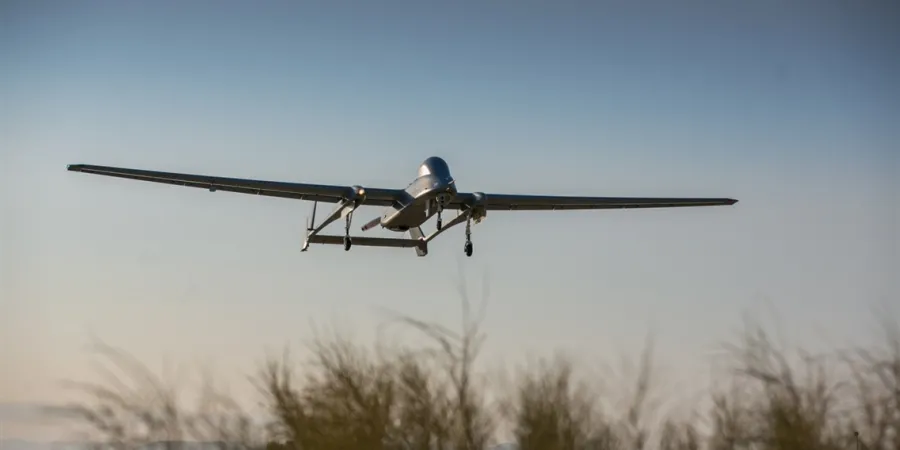IAI Launches New Capability for Heron UAV: Take-off and Landing with Remote Satellite Communication
The new technological and operational capability enables the Heron UAV to operate long-distance missions and use remote sites with minimal infrastructure for landing and takeoff, all with satellite communication
IsraelDefense
| 04/02/2018
Israel Aerospace Industries (IAI) will present a new operational and technological capability to the Heron RPA Family at the Singapore Air Show next week. With the new capability, the Heron can automatically land in remote runways located thousands of kilometers away, where it is serviced by a small team and basic fueling infrastructure before it takes off for another mission.
The new capability also leads to substantial saving in command stations and flying staff resources since it eliminates the need to return to the original takeoff point for fueling, thus saving on flight-time and fuel, increasing operational availability in the mission area and providing several options for routine and emergency landing.
The Heron Family has a long, successful operation record gained through years in the service of the Israeli, German, and other air forces around the world. The Heron Family consists of the Heron TP, Super Heron, and Heron I, used for prolonged strategic and tactical missions and capable of flying in tough weather conditions, carry multiple sensors simultaneously and transmit real-time information to the forces in the field and the decision makers.
Shaul Shahar, Executive Vice President of IAI's Military Aircraft Group, said, "Upgrading the Heron Family’s operational capability meets our clients' need for high operational flexibility and is expected to increase the number of markets we target. This is a technological and operation quantum leap which we enthusiastically embrace."
The new technological and operational capability enables the Heron UAV to operate long-distance missions and use remote sites with minimal infrastructure for landing and takeoff, all with satellite communication
Israel Aerospace Industries (IAI) will present a new operational and technological capability to the Heron RPA Family at the Singapore Air Show next week. With the new capability, the Heron can automatically land in remote runways located thousands of kilometers away, where it is serviced by a small team and basic fueling infrastructure before it takes off for another mission.
The new capability also leads to substantial saving in command stations and flying staff resources since it eliminates the need to return to the original takeoff point for fueling, thus saving on flight-time and fuel, increasing operational availability in the mission area and providing several options for routine and emergency landing.
The Heron Family has a long, successful operation record gained through years in the service of the Israeli, German, and other air forces around the world. The Heron Family consists of the Heron TP, Super Heron, and Heron I, used for prolonged strategic and tactical missions and capable of flying in tough weather conditions, carry multiple sensors simultaneously and transmit real-time information to the forces in the field and the decision makers.
Shaul Shahar, Executive Vice President of IAI's Military Aircraft Group, said, "Upgrading the Heron Family’s operational capability meets our clients' need for high operational flexibility and is expected to increase the number of markets we target. This is a technological and operation quantum leap which we enthusiastically embrace."



